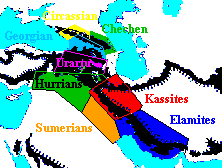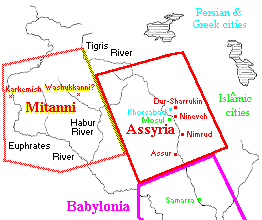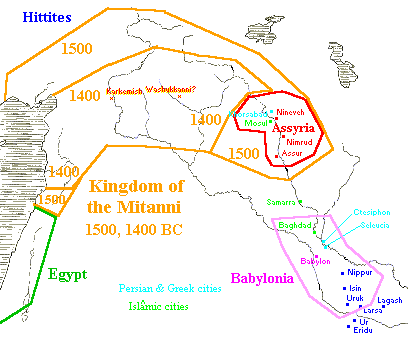| |
Kings of Mitanni
| Parattarna (I) |
c.1530/1480? |
| Kirta |
|
| Shuttarna I |
c.1560? |
| Parsatatar |
|
| Saushtatar |
c.1500/c.1430 |
Control over Assyria;
Egyptians in Syria, c.1478 |
| Parrattarna II? |
| Artatama I |
c.1430 |
| Shuttarna II |
c.1400 |
| Artashumara |
|
| Tushratta |
c.1385-c.1350 |
marries daughter to Amenhotep III;
Defeat by
Hittites, 1370 |
| Artatama II |
rival |
Shuttarna III,
Shattiwaza,
Shattuara I,
Wasashatta,
Shattuara II |
confused |
Hittites reduce Syria, c.1340;
Assyrians overthrow Mitanni, c.1330 |
 This is one of the more obscure and intriguing important kingdoms of the 2nd millennium BC. One of the ancient non-Semitic and non-Indo-European peoples of the
Middle East, like the Sumerians, Elamites, Kassites, and Urartuans, the Hurrians briefly come into their own. Just where they came from is obscure. It tended to be previously thought that some time after 2000 they moved out of the mountains and occupied the great bend of the Euphrates River (the
Jazirah or Nahrin) and the upper Tigris Valley. Now (cf. Amélie
Kuhrt, The Ancient Near East, c.3000-330 BC, Routledge, 1995, 2000, volume I, pp.284-289), it appears possible that they occupied these areas originally, all the way down to the environs of Nineveh. This is one of the more obscure and intriguing important kingdoms of the 2nd millennium BC. One of the ancient non-Semitic and non-Indo-European peoples of the
Middle East, like the Sumerians, Elamites, Kassites, and Urartuans, the Hurrians briefly come into their own. Just where they came from is obscure. It tended to be previously thought that some time after 2000 they moved out of the mountains and occupied the great bend of the Euphrates River (the
Jazirah or Nahrin) and the upper Tigris Valley. Now (cf. Amélie
Kuhrt, The Ancient Near East, c.3000-330 BC, Routledge, 1995, 2000, volume I, pp.284-289), it appears possible that they occupied these areas originally, all the way down to the environs of Nineveh.
Previously, it was thought that, around 1600, an Iranian people, the
Mitanni, had established themselves among the Hurrians as a warrior aristocracy, founding the Kingdom known by that name. The evidence for this was Indo-Aryan names of the Kings and the invocation of
Vedic gods: A treaty preserved by the Hittites with the Mitanni King Shattiwaza has them listing gods named
"Mitrasil," "Arunasil," and "Indar," which are clearly the Vedic gods
Mitra, Varuna, and Indra, the first two simply with "-il," a Semitic element for "god," added. This would have been the farthest west that an
Indo-Ayran people penetrated. Now, however, this evidence apparently seems more ambiguous than previously thought (cf.
Kuhrt, pp.296-297). Hurrian names, or Hurrianized names, and Hurrian gods (e.g. the storm god Teshub and
Shaushga, the Hurrian equivalent of the Assyro-Babylonian Ishtar) actually dominate the record that we have. If there had been a foreign warrior aristocracy, it looks like it was assimilated rapidly and left few traces by the time of
Shattiwaza. This does not require a very radical rethinking of the situation, however. The Indo-Aryan
influence is unmistakeable. The proximity of durable Into-Aryan speakers in Iran is obvious. The only question is the extent of the influence, or of the physical presence of Iranians among the
Hurrians. Such questions are probably now unanswerable. Characteristic of the obscurity of the history of this kingdom, the capital,
Washukkanni, has never been positively located (now thought to be Tell al-Fakhariyeh in Syria), leaving us without direct documentary evidence of Mitannian history from archives or inscriptions. The dating is thus, even for the period, especially problematic. And, as the Hurrians themselves were subsequently assimilated into later linguistic communities, ultimately that of
Aramaic speakers, any evidence of Iranians who might be been assimilated among
them is lost even more absolutely. Hurrians as a warrior aristocracy, founding the Kingdom known by that name. The evidence for this was Indo-Aryan names of the Kings and the invocation of
Vedic gods: A treaty preserved by the Hittites with the Mitanni King Shattiwaza has them listing gods named
"Mitrasil," "Arunasil," and "Indar," which are clearly the Vedic gods
Mitra, Varuna, and Indra, the first two simply with "-il," a Semitic element for "god," added. This would have been the farthest west that an
Indo-Ayran people penetrated. Now, however, this evidence apparently seems more ambiguous than previously thought (cf.
Kuhrt, pp.296-297). Hurrian names, or Hurrianized names, and Hurrian gods (e.g. the storm god Teshub and
Shaushga, the Hurrian equivalent of the Assyro-Babylonian Ishtar) actually dominate the record that we have. If there had been a foreign warrior aristocracy, it looks like it was assimilated rapidly and left few traces by the time of
Shattiwaza. This does not require a very radical rethinking of the situation, however. The Indo-Aryan
influence is unmistakeable. The proximity of durable Into-Aryan speakers in Iran is obvious. The only question is the extent of the influence, or of the physical presence of Iranians among the
Hurrians. Such questions are probably now unanswerable. Characteristic of the obscurity of the history of this kingdom, the capital,
Washukkanni, has never been positively located (now thought to be Tell al-Fakhariyeh in Syria), leaving us without direct documentary evidence of Mitannian history from archives or inscriptions. The dating is thus, even for the period, especially problematic. And, as the Hurrians themselves were subsequently assimilated into later linguistic communities, ultimately that of
Aramaic speakers, any evidence of Iranians who might be been assimilated among
them is lost even more absolutely.

The short history of the kingdom was an important period in the history of the Middle East. The first kings had to contend with Egypt at the height of its military power in the
XVIII Dynasty. Both Thutmose I and Thutmose III reached the Euphrates; but the Mitanni eventually fought the Egyptians to at least a draw, and cordial relations ensued, including marriages between the courts. About a century as a Great Power follows. The
Hittites, emerging from a period of confusion, then upset the status quo with a devastating defeat of
Tushratta, setting off a precipitous decline in the kingdom. Rival claimants for the throne soon enabled Assyria, a Mitanni vassal for more than a century, to regain her independence, the Hittites returned to reduce a rump Mitanni state to Hittite vassalage, and finally the Assyrians swept the kingdom into history, soon with nothing whatever left to mark the existence of either the Mitanni or the
Hurrians. The Hittites subsequently fought to their own draw with the Egyptians, and another
modus vivendi (now with the
XIX Dynasty), until being swept away themselves, leaving the field to, of course, the
Assyrians.
The list of Kings is gleaned from Amélie Kuhrt [op.cit., p.290], Georges Roux,
Ancient Iraq [Penguin Books, 1964, 1992], and the Cultural Atlas of Mesopotamia and the Ancient Near East, by Michael Roaf [Facts on File, 1966, 2000, p.133].
The Penguin Atlas of Ancient History, by Colon McEvedy [Penguin Books, 1967], skips from 1600 to 1300, missing the entire history of Mitanni, but then shows a small Mitanni Kingdom in 1300, 1200, and 1000, when we can say with some certainty that it had already been erased by the Assyrians. The main map is based on the
Cultural Atlas and the Historical Atlas of the Ancient World, 4,000,000-500 BC, by John Haywood [Barnes & Noble, 1998, 2000, §1.12].
Kelley L. Ross,
Ph.D.
|
|


 This is one of the more obscure and intriguing important kingdoms of the 2nd millennium BC. One of the ancient non-Semitic and non-Indo-European peoples of the
Middle East, like the Sumerians, Elamites, Kassites, and Urartuans, the Hurrians briefly come into their own. Just where they came from is obscure. It tended to be previously thought that some time after 2000 they moved out of the mountains and occupied the great bend of the Euphrates River (the
Jazirah or Nahrin) and the upper Tigris Valley. Now (cf. Amélie
Kuhrt, The Ancient Near East, c.3000-330 BC, Routledge, 1995, 2000, volume I, pp.284-289), it appears possible that they occupied these areas originally, all the way down to the environs of Nineveh.
This is one of the more obscure and intriguing important kingdoms of the 2nd millennium BC. One of the ancient non-Semitic and non-Indo-European peoples of the
Middle East, like the Sumerians, Elamites, Kassites, and Urartuans, the Hurrians briefly come into their own. Just where they came from is obscure. It tended to be previously thought that some time after 2000 they moved out of the mountains and occupied the great bend of the Euphrates River (the
Jazirah or Nahrin) and the upper Tigris Valley. Now (cf. Amélie
Kuhrt, The Ancient Near East, c.3000-330 BC, Routledge, 1995, 2000, volume I, pp.284-289), it appears possible that they occupied these areas originally, all the way down to the environs of Nineveh.
 Hurrians as a warrior aristocracy, founding the Kingdom known by that name. The evidence for this was Indo-Aryan names of the Kings and the invocation of
Vedic gods: A treaty preserved by the Hittites with the Mitanni King Shattiwaza has them listing gods named
"Mitrasil," "Arunasil," and "Indar," which are clearly the Vedic gods
Mitra, Varuna, and Indra, the first two simply with "-il," a Semitic element for "god," added. This would have been the farthest west that an
Indo-Ayran people penetrated. Now, however, this evidence apparently seems more ambiguous than previously thought (cf.
Kuhrt, pp.296-297). Hurrian names, or Hurrianized names, and Hurrian gods (e.g. the storm god Teshub and
Shaushga, the Hurrian equivalent of the Assyro-Babylonian Ishtar) actually dominate the record that we have. If there had been a foreign warrior aristocracy, it looks like it was assimilated rapidly and left few traces by the time of
Shattiwaza. This does not require a very radical rethinking of the situation, however. The Indo-Aryan
influence is unmistakeable. The proximity of durable Into-Aryan speakers in Iran is obvious. The only question is the extent of the influence, or of the physical presence of Iranians among the
Hurrians. Such questions are probably now unanswerable. Characteristic of the obscurity of the history of this kingdom, the capital,
Washukkanni, has never been positively located (now thought to be Tell al-Fakhariyeh in Syria), leaving us without direct documentary evidence of Mitannian history from archives or inscriptions. The dating is thus, even for the period, especially problematic. And, as the Hurrians themselves were subsequently assimilated into later linguistic communities, ultimately that of
Aramaic speakers, any evidence of Iranians who might be been assimilated among
them is lost even more absolutely.
Hurrians as a warrior aristocracy, founding the Kingdom known by that name. The evidence for this was Indo-Aryan names of the Kings and the invocation of
Vedic gods: A treaty preserved by the Hittites with the Mitanni King Shattiwaza has them listing gods named
"Mitrasil," "Arunasil," and "Indar," which are clearly the Vedic gods
Mitra, Varuna, and Indra, the first two simply with "-il," a Semitic element for "god," added. This would have been the farthest west that an
Indo-Ayran people penetrated. Now, however, this evidence apparently seems more ambiguous than previously thought (cf.
Kuhrt, pp.296-297). Hurrian names, or Hurrianized names, and Hurrian gods (e.g. the storm god Teshub and
Shaushga, the Hurrian equivalent of the Assyro-Babylonian Ishtar) actually dominate the record that we have. If there had been a foreign warrior aristocracy, it looks like it was assimilated rapidly and left few traces by the time of
Shattiwaza. This does not require a very radical rethinking of the situation, however. The Indo-Aryan
influence is unmistakeable. The proximity of durable Into-Aryan speakers in Iran is obvious. The only question is the extent of the influence, or of the physical presence of Iranians among the
Hurrians. Such questions are probably now unanswerable. Characteristic of the obscurity of the history of this kingdom, the capital,
Washukkanni, has never been positively located (now thought to be Tell al-Fakhariyeh in Syria), leaving us without direct documentary evidence of Mitannian history from archives or inscriptions. The dating is thus, even for the period, especially problematic. And, as the Hurrians themselves were subsequently assimilated into later linguistic communities, ultimately that of
Aramaic speakers, any evidence of Iranians who might be been assimilated among
them is lost even more absolutely.
